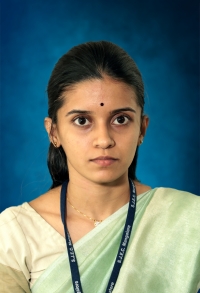
Lecturer
Since my childhood I always wanted to teach because there was always a teaching-learning environment in my home with both my parents being teachers.
When I often think why I have chosen Physics as my area of teaching, I realize that I enjoy teaching as well as learning physics all along. I believe that teaching can happen only if continuous learning happens. Along the way in my learning career I have had remarkable teachers and mentors that were able to teach me not only the fundamentals of writing, mathematics, and science, but instil in me the confidence to tackle new problems with teaching and cutting-edge research.
At times when I ask a student an explanation for why he/she is not attending a particular course handled by someone their usual reply is that the course isn’t interesting enough to drive them. It’s crucial to teach students that "learning" is their own responsibility and that they must actively participate in their own learning. It is the duty of the teacher to foster an environment where students can learn more effectively using various modes of instruction, including lectures, discussions, and hands-on activities.
When I go to an undergraduate classroom, I am fully aware that a student’s life does not begin and end at the university. It’s about how my course is helping them to experience Physics and appreciate it rather than seeing it as a mere subject. I believe that it’s their interpersonal skills that matter and that’s why I try to include group work in my lectures and labs. At the end of each lecture I deliver, all that matters to me is whether or not each learner is content with what he/she has attended and appreciates the beauty of physics.
In that sense there’s a brief strategy I try to-
1. Focus only on student’s needs: I try to make it possible for students with different learning styles to interact with the course material by using oral, written, and visual components in my lectures. In the learning spaces that I co-create with students, I try to foster a sense of community. Finding a balance between my own course learning objectives and those of my students is something that interests me.
2. Build curiosity in students: I provide a quick synopsis for the following lecture and the reading assignments listed on the syllabus at the end of the class. Prior to the presentation, I also provide real-world accounts, news, and/or hypothetical situations related to the subject.
3. Revisit: I revisit all the topics covered in the previous lecture and ask students to help me note down the points of the last lecture so that they can actively participate.
4. Solve problems: In order to break the monotony of theoretical explanations I try to include problems in my lecturers. Students solve them up and I ask a couple of them to provide the solution on the board. That helps to build confidence in them. Sometimes I ask one student to begin a problem by, say, underlining the key phrase in the written problem and to pass the chalk to the next student who writes the problem's governing equation(s) and passes the chalk to the next student who fills in some of the equation's variables, and so on until the problem—one that the students initially did not understand—is solved.
5. Make students think: I post several questions during the lecture and give students several minutes to think and discuss their answers with classmates.
I am still on myself and finding new ways to be a better teacher. I constantly look up to my colleagues and seniors to know more ways to improve my ways of presentations. I am hopeful that with time I shall have a better understanding of students and their perspective towards learning.
RESEARCH PHILOSOPHY:
I am yet to start my research journey but I believe that research is methodical study of any area we have chosen and working on the assumptions made. It’s transparency and ethics that matter in research.
Develop and identify theory-based links between management practices and relevant work outcomes, in light of ethical, legal and international environments.
I believe that a researcher should always work to:
• Identify opportunities to integrate theoretical and methodological issues across disciplines, such as the ethics, law, international business and technology.
• Promote collaboration with others not only to enhance self-development but also develop others.
• Share findings widely, including presenting in-press and keeping in lectures to students in order to expose them advances the fields.
| Sl.No | Qualification Level | University | Area of Specialization | Year of completion | Awards | ||||
|---|---|---|---|---|---|---|---|---|---|
| 1 | MSc | Manipal Academy of Higher Education, Manipal | Condensed Matter Physics | 2020 | |||||
| 2 | BSc | Mangalore University | Physics Chemistry Mathematics | 2018 |
5th rank holder under Mangaluru University INSPIRE SHE Award CV Raman Scholarship
|
||||
Cultural Club under CCG Chairperson (2023-2024)
Department MATLAB Coordinator (2023-2024, 2022-2023)
Department Virtual lab coordinator (2022-23)
e-Learning coordinator (2022-23)
VTU MOOCs Coordinator (2022-2023)
Designation: Lecturer
Date of joining: 24/03/2022
| NPTEL, E-awareness, online | 10/07/2023 |
|
SJEC, MATLAB, CoreEL Technologies, SJEC |
01/06/2023-02/06/2023 |
|
Online Workshop on Tools to design E-book content by the dept. of chemistry, SJEC, Mangalore |
29/04/22 |
|
“Curriculum Insights, Implications and Actions” by Dr.Ashok Rao organized by the dept. of Electricals and Electronics, SJEC, Mangalore |
04-04-2022 |
| 2nd Edition of the International Conference of Knowledge Management in Higher Education Institutions organized by Manipal University Jaipur in Association with Library and Learning Resources Center, University of Dubai | 11-04-2022 |
Ms Anarghya S
Lecturer
B.Sc, M.Sc